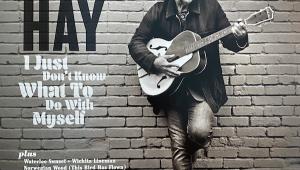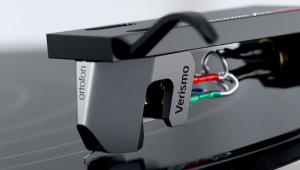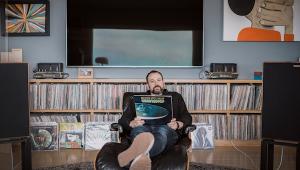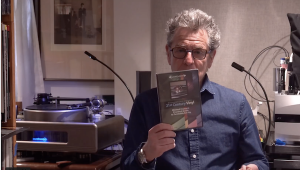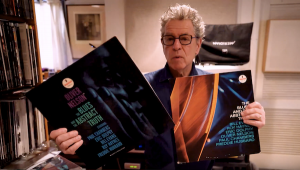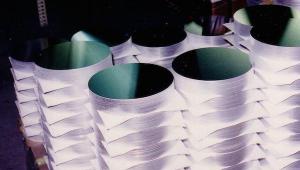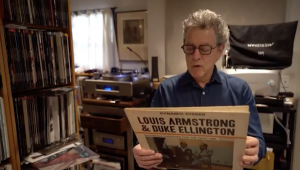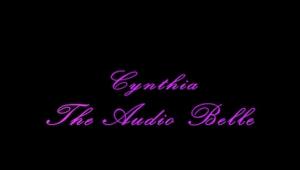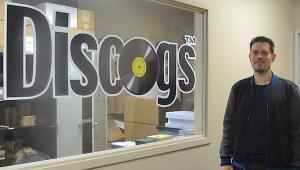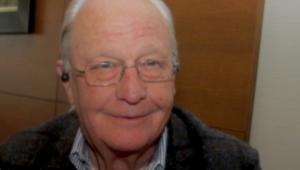Masters of the Art of Mastering Part 2
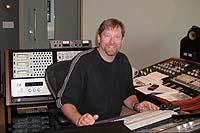
Editor's note (please read!). This story was written in the late 1980's. I don't remember the exact date. At the time, Greg Calbi and Ted Jensen were working for Sterling Sound. Between then and today (2005), Calbi left Sterling and went to work for competitor Masterdisk for a few years. He later returned to the new Sterling Sound (www.sterling-sound.com), a sprawling complex on Manhattan's west side near the "meat packing district," where Ted Jensen and George Marino also work as part of one of the most distinguished teams of mastering engineers anywhere in the world.-MF
Today, Calbi and Jensen agree that whatever is on the master tape can be transferred to LP without compression, re-equalization or any other technical sleight of hand tricks to "compensate" for the "old fashioned" technology.
Let me say it again. Whatever is on the master tape in terms of dynamics and frequency response can be transferred to vinyl without degradation. My listening experience tells me the same isn't true of compact discs made from good analogue sources, which always seem to lose information in the translation to digital.
And since DMM can yield up to thirty minutes a side, there is no excuse for abridging the LP, or for adding tracks to the CD version of an album- whichever way you want to look at the current practice of many record companies. That is, if the record is being cut DMM.
Both Jensen and Calbi also agree that the so-called 90dB dynamic range of the compact disk medium is another myth that should be dispelled. The first 20dB of it, they say, is unusable because of the poor low-level resolution of the medium. And since you "run out of bytes" beyond a certain point on top, the actual useable dynamic range of compact disks is 60 to 70dB, virtually identical to a Direct Metal Master cut!
Many digital enthusiasts say we analogue lovers are deluding ourselves because all modern cutting lathes feature a sample and hold "preview" system that digitizes the signal before cutting anyway. Not necessarily so. In their system, the signal never enters the digital domain say Calbi and Jensen.
If anyone has been deluded, it’s the digital fetishists who think music is tainted unless the CD is "DDD". Up until a year ago, according to Calbi and Jensen, 95% of DDD recordings were really DADAD. Since digital boards were a rarity, the original digital recording had to be converted to analog, mixed and then converted back to digital. In the mastering stage, the digital mixdown once again had to be converted to analog before final digitization on the Sony 1630. With D/A conversion being the weak link in the digital chain, and with so many conversions taking place on the way to the pitted path, how could CDs sound good? Answer: They couldn't and didn't.
I asked Calbi and Jensen if today, when they audition a CD they've mastered, it sounds like the original tape. "No way", they replied. Any time you move a signal around, there are bound to be changes. It’s inevitable, analog or digital. As to which format changes it the least, they fudged a bit. It depends on the quality of the original, the kind of music and many other factors, they claimed.
But I received what I considered to be so many mixed conflicting signals from the two masterers that I felt they were covering themselves, and justifiably so. They're involved in a very political business, even without broaching the analog/ digital issue.
So while Calbi acknowledges that the analog domain mastered acetate (from the original two track digital mixdown of an analogue multi-track [or "ADA"]) of James Taylor's latest album Never Die Young sounds far better than one mastered digitally through the new Neve DTC board and converted to analog just before the cutter head [or "ADDA"], Calbi is enthusiastic about the sound of the "ADD" CD version. I can't see why it should sound any better, or even as good as the analog mastered LP. I would hope the D/A converter used at Sterling to decode the original PCM sounds at least as good as the one in the average CD player!
Neither Calbi or Jensen were willing to take strong stands in the analog/digital debate, except to debunk what they think are the myths on both sides, and to remain simultaneously enthusiastic and conditional about both formats.
So when I implored them both to master LPs from analog master tapes when available, rather than using the digitized CD master, both replied that they always do just that, even though it can be more time consuming and risky. Calbi recounted how he once decided to use the digitized master to cut an LP, almost letting it go through the production chain, but finally "in good conscience" pulled it back, to re-cut it from the analogue master.
Why? The digitized acetate didn't sound good. But neither Calbi nor Jensen were willing to extrapolate the obvious outloud. Both agreed that in some cases digitization was beneficial, depending on the source material involved.
Which did they prefer to begin with. Analog recordings, or digital? Again it depended. On this issue both did more waffling than a chef at the International House of Pancakes. But who can blame them? They're masterers, not crusaders.
Not that they weren't willing to express a strong opinion when pressed (no pun intended, although I wish it was). I asked Jensen about Stop Making Sense, the second worst Talking Heads album (after True Stories). "Oh, SSSSSStop Making SSSSSEnse?" laughed Jensen. He didn't blame digital recording though. He blamed a human being for the "alienating" sound. Figure out who for yourself. You've got two clues already (not Jensen and Calbi or course!).
Which brought me to another important question: exactly what kinds of sonic manipulations do masterers utilize in preparing master tapes for transfer to disk? According to Calbi and Jensen, almost all of it is equalization. Compression and reverb are rarely used. Obviously today the temptation of the upward tilt is too strong for most producers.
I came away from my conversation with Calbi and Jensen assured that they share our basic sonic values. They too preferred dynamic, unprocessed, three dimensional, recordings. Unfortunately few come their way these days. Both agree that while the technology has gotten more sophisticated, sound quality has declined in many ways over the past fifteen years.
I compared an original British pressing of Steve Winwood's Arc Of A Diver (Island ILPS 29576) with Jensen's DMM cut of Chronicles- a Winwood compilation containing a number of tracks from Arc Of A Diver and its obvious that he was given a digital tape to master, although I didn't ask him. The DMM is two dimensional, grainy and flaccid. The British original (from 1980) is obviously all analog and so much more dimensional and musical. It’s not that Jensen equalized heavily- the overall frequency balance isn't all that different. Everything's just cardboard cut-out like, and behind a glass wall.
I did ask both Calbi and Jensen why the British Island Tea For The Tillerman sounded so startlingly superior to the American A&M version when both were mastered at Sterling from the same tape and in fact the stampers were generated from the same master cut. It’s in the plating, the vinyl and the pressing machine, they agreed.
For the most part, throughout the interview, Calbi and Jensen sought to maintain an outward air of neutrality regarding technological issues, accepting the digital revolution as a natural progression and something beyond their ability to control. They simply try to do the best they can with what they're given.
That strategy is obviously paying off for Sterling. According to Jensen, on any given week, Sterling mastered recordings usually account for thirty to thirty five percent of the Billboard "Top 200" chart.
Like the safe, sturdy iconoclastic old Saabs that I love to drive, which technologically (but not esthetically) have been overtaken by newer, faster, sleeker (though short lived, tinnier and more generic) models, the analog LP has been surpassed by sexy, high-tech optical digital disks. But even though they didn't come right out and say it, I think Calbi and Jensen know that analog vinyl continues to sound far superior to CD. I bet they look back fondly on the days when vinyl was king. I have a feeling they wish it still was. I do anyway.
End


